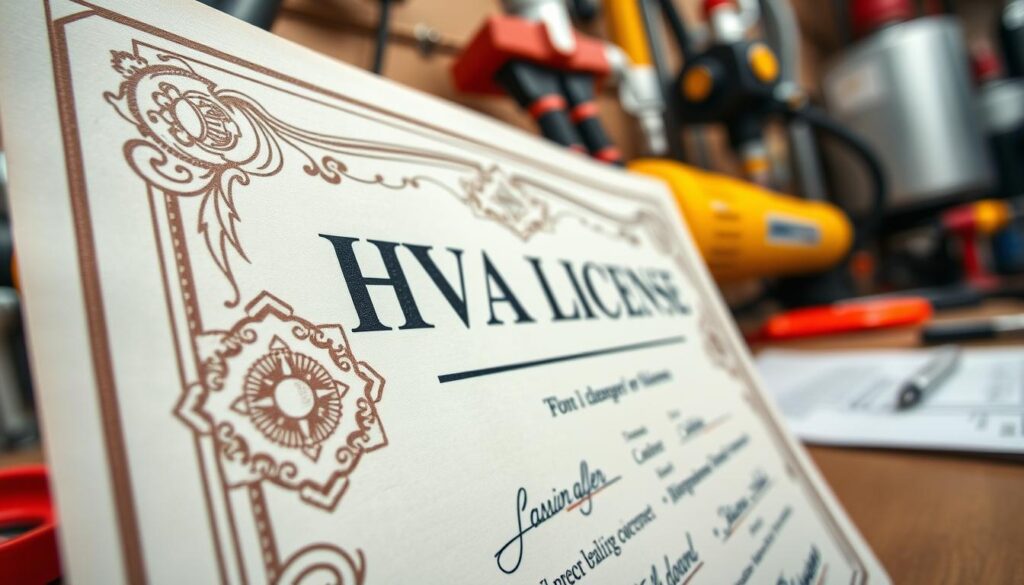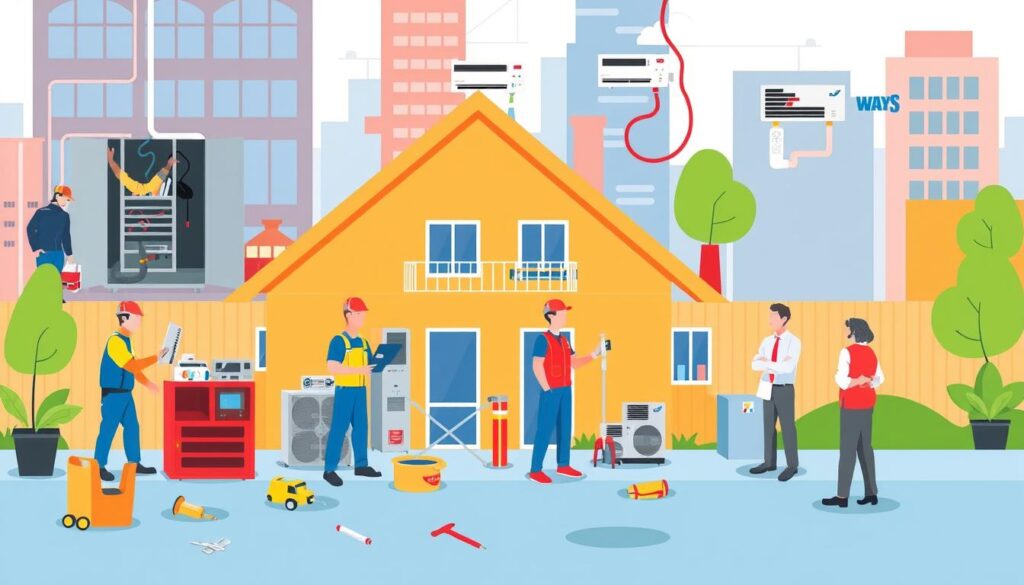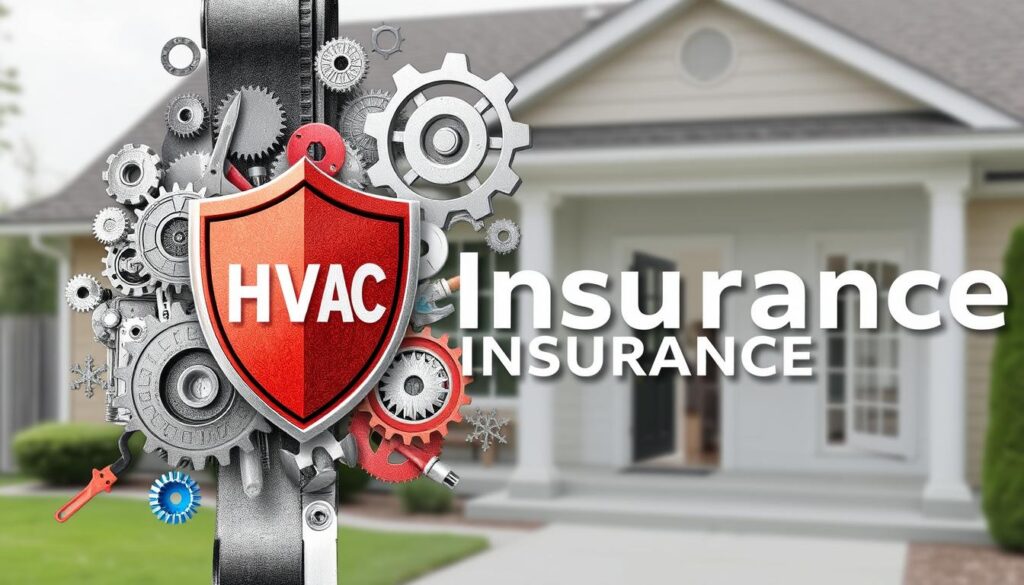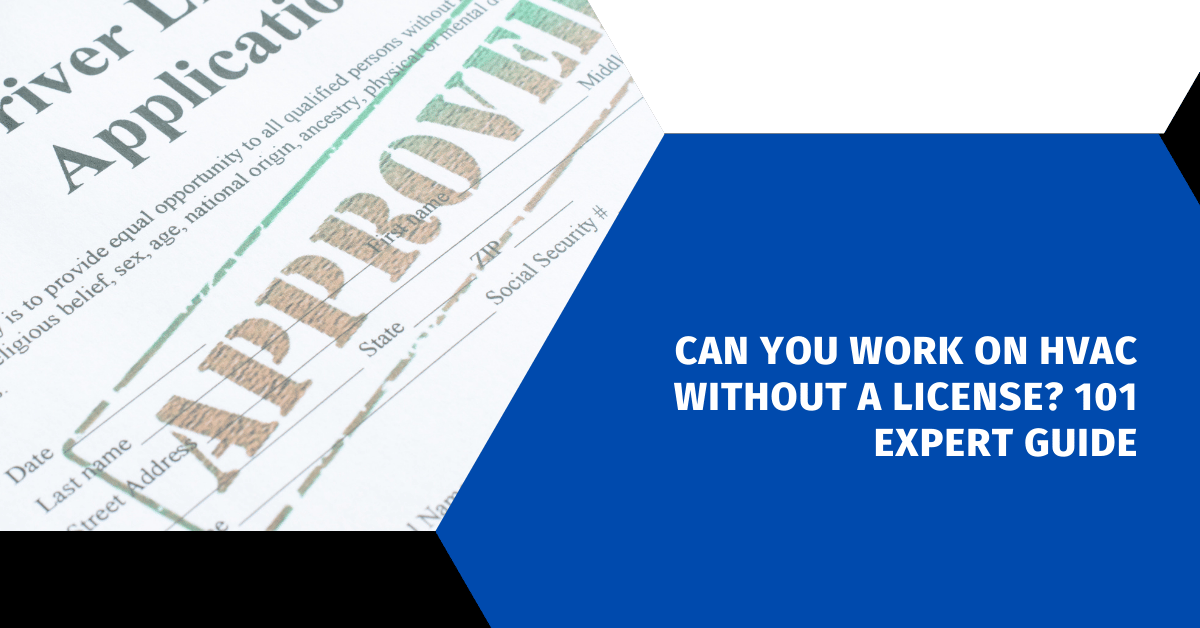Affiliate Disclosure
HVAC Guide Guys is a participant in the Amazon Services LLC Associates Program, an affiliate advertising program designed to provide a means for sites to earn advertising fees by advertising and linking to Amazon.
Can You Work On HVAC Without A License? I’ve always been drawn to the world of HVAC. The way ducts work together and the flow of refrigerants is fascinating. It keeps our places comfortable all year. But, I’ve always wondered: can you work on HVAC without a license?
Today, the answer isn’t simple. Laws about HVAC licenses change from state to state. Even within cities, rules can differ. Knowing about HVAC licenses is key for anyone working in this field.

Key Takeaways
- HVAC licensing rules vary across the U.S., with some states not needing a license.
- Many cities have their own rules, even if the state doesn’t.
- Getting the right HVAC certifications and licenses is important. It makes sure your work is legal and your customers are safe.
- The cost of getting licensed can be a few hundred to several thousand dollars. It depends on the specific rules.
- It’s crucial to know the legal risks of working without a license. This applies to both professionals and DIY fans.
Table of Contents
Understanding HVAC Licensing Requirements Across States
HVAC licensing rules change a lot from state to state in the U.S. Some states need a license for HVAC workers, while others don’t. Even without a state license, local areas might have their own rules.
States Requiring Mandatory Licensing
In Texas and Florida, HVAC workers must get a state license. They need to meet certain requirements like experience and passing exams. They also need to have insurance or bonds.
States Without Licensing Requirements
But, places like New York, Colorado, and Illinois don’t require a state license for HVAC techs. Yet, local areas might still have their own rules for HVAC work.
Municipal Level Regulations
In New York City, for example, HVAC workers need special licenses. Cities like Buffalo and Syracuse also have their own rules. It’s key to know both state and local HVAC laws.
| State | HVAC Licensing Requirements |
|---|---|
| Texas | Statewide licensing required for HVAC contractors |
| Florida | Statewide licensing required for HVAC contractors |
| New York | No statewide licensing, but local municipalities may have their own requirements |
| Colorado | No statewide licensing, but local municipalities may have their own requirements |
| Illinois | No statewide licensing, but local municipalities may have their own requirements |
Can You Work On HVAC Without A License?
Working on HVAC systems without a license is possible in some states. But, there are big restrictions and legal issues to think about. The rules for HVAC work change a lot across the U.S. Some states need strict licenses, while others are more relaxed.
In states without a license for unlicensed HVAC work, you might do some tasks. These include maintenance, service, and repairs on parts of cooling and heating systems. But, even in these places, local rules might ask for registration or certification for HVAC work restrictions. Also, the EPA Section 608 Certification is needed everywhere for refrigerant handling.
Doing HVAC work without the right credentials can cause legal problems and limit job chances. Legal HVAC practice is key for safety and efficiency. It also protects the technician and the client from legal issues. Unlicensed work can lead to contract limits and fines.
HVAC technicians need to know the licensing rules in their state and area before starting work. Getting the right certifications and licenses is important. It ensures you follow the law and opens up more job chances in the HVAC field.
Explore Our HVAC Shop
Looking for top-rated HVAC tools, parts, and accessories? Visit our shop and find the perfect solution for your needs.
Visit the ShopEssential Certifications for HVAC Technicians
Certifications are key in the HVAC world. They show a technician’s skills and open doors to new jobs. While HVAC certifications aren’t always needed, they can really boost a technician’s pay and job chances.
EPA Section 608 Certification
The EPA Section 608 Certification is a must for HVAC techs who work with refrigerants. It makes sure they know how to handle refrigerants right. This helps avoid harming the environment and legal trouble.
NATE Certification Benefits
The NATE (North American Technician Excellence) Certification is optional but very valued. Techs with this certification can make up to $15,000 more a year. It’s a smart choice for their career.
Local Trade Certifications
There are also HVAC trade certificates from local and state places. For example, New York City has special licenses for HVAC jobs. These show a tech’s skills and can lead to better jobs and higher pay.
| Certification | Description | Benefits |
|---|---|---|
| EPA Section 608 | Mandatory for handling refrigerants | Ensures safe and environmentally responsible practices |
| NATE Certification | Optional, but highly respected industry credential | Can increase earning potential by up to $15,000 annually |
| Local Trade Certifications | Vary by jurisdiction, such as NYC’s HVAC specialty licenses | Demonstrate expertise and can lead to better job opportunities and higher salaries |
Getting the right HVAC certifications can really help an HVAC tech’s career. It shows they’re skilled and serious about their work. This makes them more appealing to employers and can lead to better pay.
Career Paths in HVAC Without a License
Starting a career in HVAC doesn’t always need a license, especially for beginners. There are many HVAC career options for those without a formal license. These include entry-level jobs and HVAC apprenticeships.
One way to start is in an entry-level HVAC job, like an installer or technician assistant. You work under a licensed HVAC pro. This way, you get real-world experience and skills to get certified or licensed later.
- The Bureau of Labor Statistics says HVAC jobs will grow by 15% from 2016 to 2026. This is much faster than most jobs.
- In some states, you can work in HVAC without a license. You can do maintenance, repairs, and light installations with a licensed tech’s help.
- Some people also work in related fields like energy auditing or building maintenance. Here, HVAC skills are useful, but a license isn’t always needed.
Another choice is an HVAC apprenticeship. It mixes on-the-job training with classroom learning. After finishing an apprenticeship, you might get the licenses or certifications needed to move up in your career.
“Getting certifications like the EPA Section 608 and NATE can help unlicensed HVAC workers grow in their field. It can also boost their pay.”
While working without a license might be possible in some places, it’s crucial to know the legal risks. Following local laws and getting the right certifications or licenses are key for success in HVAC.

Explore Our HVAC Shop
Looking for top-rated HVAC tools, parts, and accessories? Visit our shop and find the perfect solution for your needs.
Visit the ShopEducation and Training Requirements
There are many ways to become an HVAC pro. You can choose from HVAC education at technical schools, community colleges, or HVAC apprenticeships. Each path helps you learn the skills needed for a great career.
Technical School Programs
Technical and vocational schools have HVAC training programs lasting 6 to 9 months. These programs teach you about HVAC system design, installation, and repair. After finishing, you’re ready to start as an HVAC technician.
Apprenticeship Opportunities
HVAC apprenticeships mix work experience with classroom learning. They last 3 to 5 years. This way, you get ready for a career in HVAC while earning money.
On-the-Job Training
Some jobs offer on-the-job training for HVAC. You learn by doing, working with experienced technicians. You usually need a high school diploma or GED for these jobs.
It’s key to know that HVAC education needs can change by state and employer. Look into local rules and programs to find the right path for you.
“The growth rate for HVAC mechanics and installers in California is estimated to be 14%, according to the U.S. Department of Labor’s job search website, CareerOneStop.”
Insurance and Bonding Requirements
As an HVAC pro, knowing about insurance and bonding is key. These rules change a lot by state and city. So, it’s vital to learn what’s needed in your area.
General liability insurance is a must, with coverage levels from $100,000 to $300,000. Some places require workers’ comp, even for solo owners. Performance bonds, around $15,000, might be needed in some spots. And don’t forget commercial auto insurance if you use company vehicles.
| State | Minimum General Liability Insurance Coverage | Performance Bond Requirement |
|---|---|---|
| Ohio | $500,000 | $15,000 |
| Cincinnati, OH | $100,000 | $15,000 |
| Columbus, OH | $300,000 per person, $500,000 per occurrence | $15,000 |
Besides the basics, you might need HVAC insurance and contractor bonding. Cyber liability coverage is a good idea if you handle client data. And HVAC contractors should have specialized liability coverage. Knowing these details helps keep your business safe and legal.

Explore Our HVAC Shop
Looking for top-rated HVAC tools, parts, and accessories? Visit our shop and find the perfect solution for your needs.
Visit the ShopSalary Expectations and Career Growth
Thinking about a career as an HVAC technician? You’ll find the salary potential quite promising, especially in New York. The national average is $59,620, but in New York, it’s $68,950.
As you gain experience and get more certifications, your salary will likely go up. For instance, HVAC installers in New York make about $27.45 an hour. Technicians earn $27.74, and mechanics get $30.38 on average.
The HVAC industry is set to grow a lot in the next few years. Nationally, there’s a 6% job growth rate for HVAC workers, adding over 20,000 jobs. In New York, the growth rate is even higher, at 20%.
| Job Title | Average Hourly Wage | Average Annual Salary |
|---|---|---|
| HVAC Installer | $27.45 | $57,096 |
| HVAC Technician | $27.74 | $57,659 |
| HVAC Mechanic | $30.38 | $63,190 |
| HVAC Supervisor | N/A | $92,242 |
A career in HVAC can be very rewarding. With the demand for skilled technicians and competitive salaries, it’s a great choice. Whether you’re starting out or looking to move up, the potential for salary growth and industry growth is strong.
“The HVAC industry is poised for significant growth, with a projected 6% increase in jobs nationally and even higher rates in states like New York. This presents an excellent opportunity for those looking to build a rewarding career as an HVAC technician.”
Legal Implications and Risks
Doing HVAC work without a license can lead to big legal problems. You could face liability, contract issues, and fines. These risks are serious and can harm you financially and legally.
Liability Concerns
If an unlicensed HVAC tech damages your property or hurts someone, you might be blamed. In places like California, you could even have to pay for the tech’s medical costs. This is because you’re seen as their boss.
Contract Limitations
Using an unlicensed HVAC contractor can make your contract or warranty useless. Your homeowner’s insurance might not cover damages or injuries caused by them. This is because they’re seen as a higher risk.
Regulatory Penalties
Working without a license can lead to big fines, even criminal charges. In some places, hiring an unlicensed contractor for jobs over $500 is against the law. This means you could face penalties.
It’s key to follow HVAC regulatory compliance to protect yourself legally and financially. Always check a technician’s license before hiring them for HVAC work. This helps avoid HVAC legal risks and the consequences of unlicensed HVAC work.
Conclusion
Working in the HVAC industry without a license is possible in some places. But, getting the right licenses and certifications is a smart move. It makes sure you follow the law and shows you’re skilled to clients.
The HVAC field has solid job chances and room for growth. But, knowing local rules and keeping your skills sharp is key to doing well.
Being a licensed HVAC pro has many perks. It means you follow the law, are more credible, and ensure quality work. Without a license, you could face big legal troubles like fines and even jail time.
Getting the right licenses sets you apart from others without them. It makes your customers trust you more. And it opens up more chances in the HVAC world.
In short, while you might work in HVAC without a license in some spots, it’s not the best choice. Getting the needed licenses and certifications is worth it. It keeps you in line with industry standards, boosts your career, and gives your clients the service they need.
By focusing on professional growth and following the law, you can have a fulfilling career in HVAC. It’s a field that’s always changing, and being ready for it can make all the difference.

